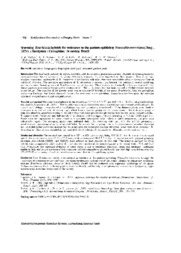Screening Brachiaria hybrids for resistance to the pasture spittlebug Notozulia entreriana (Berg, 1879) (Hemiptera : Cercopidae) in central Brazil.
Screening Brachiaria hybrids for resistance to the pasture spittlebug Notozulia entreriana (Berg, 1879) (Hemiptera : Cercopidae) in central Brazil.
Resumo: The beef cattle industry in tropical America, with its extensive production systems, depends on forage grasses for meat production. Several species of the genus Brachiaria comprise the most important of these grasses. Because of their excellent adaptation, particularly of B. decumbens to low-fertility acid soils, they have been widely adopted throughout Central and South America. The extensive monoculture of B. decumbens, however, has favored the buildup of several spittlebug species, the most damaging pests of Brachiaria in tropical America. These insects can drastically reduce plant growth, dry matter production as well as forage quality (Valério et al., 2001). A great effort has been devoted to finding grasses resistant to spittlebugs. The objective of the present work was to evaluate 28 hybrids of the genus Brachiaria, from the germplasm available at Embrapa Beef Cattle Research Center, for resistance to the spittlebug Notozulia entreriana using the selection criteria of nymphal survival and nymphal period.
Ano de publicação: 2008
Tipo de publicação: Parte de livro (capítulos de livros, trabalhos e resumos publicados em anais ou em coletâneas)
Unidade: Embrapa Gado de Corte
Observações
1 - Por padrão são exibidas publicações dos últimos 20 anos. Para encontrar publicações mais antigas, configure o filtro ano de publicação, colocando o ano a partir do qual você deseja encontrar publicações. O filtro está na coluna da esquerda na busca acima.
2 - Para ler algumas publicações da Embrapa (apenas as que estão em formato ePub), é necessário ter, no celular ou computador, um desses softwares gratuitos. Sistemas Android: Google Play Livros; IOS: iBooks; Windows e Linux: software Calibre.
Acesse outras publicações
Acesse a Base de Dados da Pesquisa Agropecuária (BDPA) para consultar o acervo completo das bibliotecas da Embrapa.

